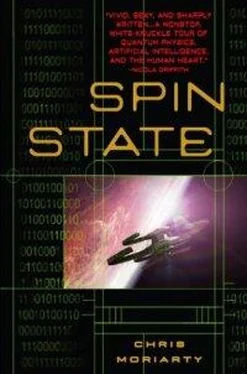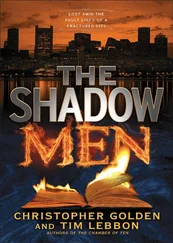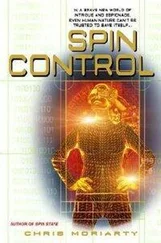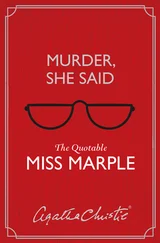Li looked up at Nguyen. “What is this?”
“Cohen wrote it. It’s a speech he gave at an ALEF meeting last week. An ALEF meeting that was downloaded by known Consortium members.”
“Oh,” Li said, and kept reading—the same words she had seen before back in Cohen’s sunny drawing room:
The Syndicates embody one evolutionary vector: the hive mentality of the cr`eche system, the thirty-year contract, the construction of a posthuman collective psychology, including cultural acceptance of euthanasia for individuals who deviate from gene-norm.
The UN, in contrast, has launched a series of what might best be described as rearguard actions. On the technological side, we have enslaved AIs (how very revealing programmers’ jargon can be); hardwired, task-dedicated artificial life of every possible description; wired humans and posthumans operating AI-platformed wetware. In essence, a plethora of attempts to subsume nonhuman intelligence into human-controlled operating systems. And in the political sphere, the General Assembly kindly picks up any stray items the technicians fail to account for by slamming the door on consciously engineered posthuman evolution, by slapping AIs with source-code patents, mandatory-feedback-loop legislation, encryption protocols, and, of course, the much-beloved thirty-year death tax.
Humanity has engineered its own obsolescence. They acknowledge it by act if not by deed. It is time for us to acknowledge it. Time for us to rethink the shape of UN politics—perhaps the very shape of the UN itself—and step into a wider, brighter posthuman future.
Li handed the fiche back to Nguyen, who snapped it off with a flourish of her fine-boned hand.
“Why show me this?”
“I want you to know what Cohen is capable of.”
“It’s just talk,” Li said uncomfortably. “You know Cohen.”
“That’s my point. He’s using you, Li. The same way he’s used the Security Council. The same way he used Kolodny.”
Li’s stomach contracted into an icy knot. “What do you mean the way he used Kolodny?” she whispered.
“You think what happened on Metz was an accident? He used Kolodny to get what he wanted, and then he left her to die. Left you all to die. Didn’t you understand why the review board tried so hard to find a way to go easy on you? Because we knew it was Cohen’s fault all along—and he was the one person we couldn’t afford to blame publicly.”
“He told me it was a malfunction,” Li said, too stunned to understand what Nguyen was saying about her own court-martial, too stunned to hear anything beyond the bare fact of the accusation.
“Well, he lied. He found the intraface. Then he started going after the wetware specs. Specs he had no business looking at. Specs we couldn’t afford to let him look at. And in doing so, he endangered the security of the mission. We had to pull him off the shunt to stop him.”
Li put a hand to her forehead, felt the fever rising beneath her skin. “You’re sure?” she asked.
“I’m sure,” Nguyen said. “I cut the link myself.”
Zona Angel, Arc Section 12: 25.10.48.
“Hell,” Cohen said. “The beastly thing’s stuck.”
He was opening a long matte-black canister, capped at both ends with silver disks of stamped metal. He was having a hard time of it, having to use Chiara’s starlet-straight front teeth to pry the lid off.
“Don’t break her pretty teeth,” Li said, and Cohen laughed.
“I’d grow her new ones,” he said. “Wouldn’t be the first time I had to tidy up a little collateral damage.”
They sat in his high-ceilinged drawing room, the chandeliers casting rippled reflections in the hand-laid panes of the garden doors. Chiara looked as beautiful as ever, perched like a bright bird on the sofa; but Li thought there was a pinched quality to the lovely face, a puffy hint of tiredness around the hazel eyes. She nearly asked Cohen if he was feeling all right—before she reminded herself that it wasn’t Cohen she was looking at. That whether some pretty girl felt tired or sad or sick had not a thing to do with the enigma sitting across the table from her.
He got the canister open at last, with a little grunt of satisfaction, and slid out a long shiny tube of architect’s fiche, which he unfurled on the low table between them. When one corner of the sheet refused to lie flat he borrowed Li’s beer to weight it down.
Li squinted doubtfully at the blank surface. “We’re supposed to read the plans off that? You’ve got something against VR now?”
“Only that I’ve been running VR scenarios ever since you sent me Korchow’s files, without getting anywhere near figuring out how to crack this nut.”
Li had been doing the same thing herself and coming up just as dry. But telling Cohen that now seemed less than productive.
He tapped the fiche. It whirred softly and lit up, casting a cool blue glow on the belly of Cohen’s wineglass, the curving flank of Li’s beer bottle. A spidery web of lines spread across the sheet and coalesced into a long, shallow curve like the arc of a twenty-kilometer-long suspension bridge. Cohen tapped in another command, and the ghostly parallelograms of solar arrays formed above and around the arc. “There. Alba. A place you ought to recognize faster than I do.”
“I guess,” Li said doubtfully.
Cohen snorted. “Spoken like a true member of the virtual generation. It took humans two hundred millennia to figure out how to read, and they’re forgetting it in a matter of centuries. Anyway.” He tapped the sheet emphatically. “These are the plans the contractor worked from. They’re much more detailed than what Korchow gave you. And, more important, I pulled them from the contractor’s files without having to go into the UNSC databases and get flagged for querying classified material.”
“Oh, right,” Li said as the flat image began to make sense to her. “There’s the commissary. And the main labs.” She grinned. “I’ve spent enough time in the tanks there to recognize them.”
“Indeed,” Cohen said. “But we’re not cracking the main labs. Our target is down here: biotech R D.”
“I don’t think I’ve ever been in that level,” Li said.
“You wouldn’t have. It’s very hush-hush. All controlled tech work. Even the researchers live in separate quarters. It’s a quarantine zone, really; look how the bulkheads cut all the way across the station on the lab levels.”
He tapped a section of the fiche, and the zone enlarged, revealing a warren of windowless, dead-end corridors and security checkpoints highlighted in red. “You’ll have to get through two security checkpoints on your way in, here and here.”
Li pointed to a cluster of bulging growths on the station’s outer skin. “What’s that?”
“Algae farm. Part of the oxygen cycle. But look here.” He pointed her back into the station’s interior. “Now what’s the job in front of us? One, we get you onto the station and into the lab wing. Two, you access the lab’s central database and manually open a line to the ship. Three, I go through the lab AI’s files, fielding any interference he sees fit to throw at us, and figure out which comp the intraface files are on. Four, you go get them. Five—and this is the real kicker—we get out without being detected. Or, in a less optimistic but more realistic scenario, at least without being positively identified.”
Li nodded, a little bemused at hearing all this from Chiara’s pretty mouth, especially since she’d always suspected the girl was rather stupid.
She picked up her beer, and the corner of the fiche popped up. She hunted around for something to set on it, and came up with a moldering first edition of Doctor Faustus .
“Can we do it?” she asked.
Читать дальше












